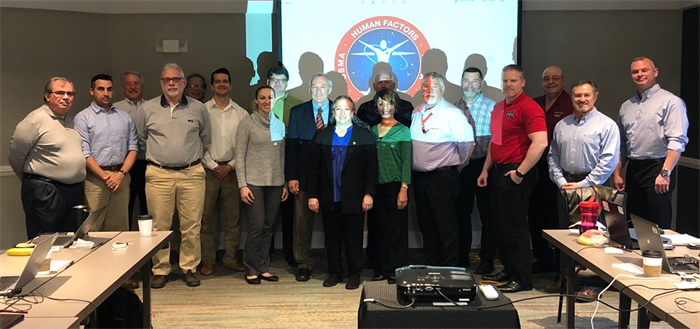Human Factors Task Force Recognized for Improving Processes
The NASA Human Factors Task Force (HFTF) received the 2019 Agency Honor Awards Group Achievement Award for its outstanding leadership in improving the use of Human Factors processes and techniques to ensure the agency continues to carry out its mission safely.
The HFTF established the program to provide awareness, insight and approaches to reduce the impact of Human Factors throughout the agency. The task force is comprised of a Human Factors specialist (on detail) and Human Factors practitioners from multiple centers who are committed to understanding Human Factors and reducing the impact of Human Factors while strengthening its capabilities. 
Trained in the use of the Human Factors Analysis and Classification System (HFACS), the team developed a NASA-specific system called NASAHFACS. Armstrong Flight Research Center tested this new taxonomy by reassessing mishaps that occurred between Fiscal Years (FY) 2014 and 2016. Armstrong used the findings to make changes to flight operations at the center.
Results from FY17 indicate the center reduced events as a result of NASAHFACS analyses, saving the center and the agency resources in time and energy while supporting flight operations. Additionally, the HFTF used NASAHFACs to code 2017 agency mishaps. The initial 2017 coding, reported to Office of Safety and Mission Assurance leadership in 2018, was well received. The HFTF will continue to trend and track agency Human Factors.
The team created and implemented numerous Human Factors tools, training and investigation tools and a four-year center trend study and agency annual report in the last two years. Upon successful completion of the 2017 initial agency annual report, and through cross-organizational dialogue, the HFTF expanded to include 15 highly experienced members from across the agency and developed a five-year plan to implement training and use of the tool in all aspects of NASA's endeavors.
The HFTF is now developing its own analysis database where data can then be tracked, trended and applied preventatively or to contribute to Corrective Action planning as needed. In addition, the team developed several programmatic tools to quickly assess and document Human Factors through the use of a quick reference guide and a Human Factors investigators checklist. The team provides education outreach through workshops, onsite training, the program web page and an informational brochure, as well as a list of current HFTF membership.
To implement the Human Factors program, the HFTF is developing a handbook that will be released via a Scientific Technical Information publication. The HFTF’s efforts have filled a void in agency and center-level awareness, trending and addressing Human Factors. The HFTF will continue working to address Human Factors issues throughout NASA to ensure safer mission accomplishment.
For more information, contact Safety Culture Program Manager Tracy Dillinger.
